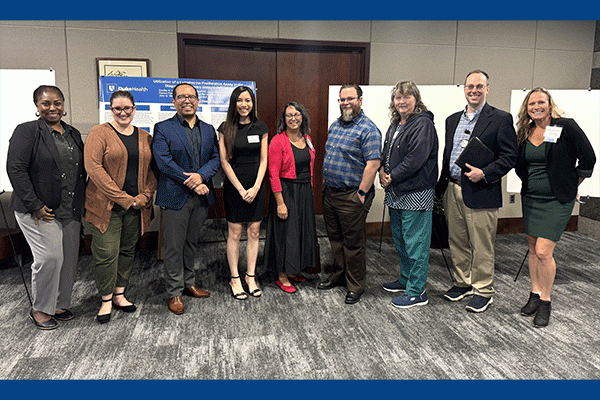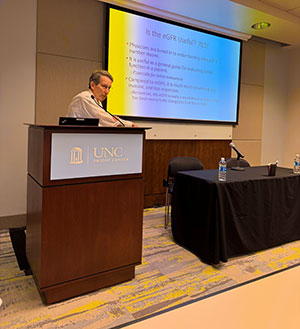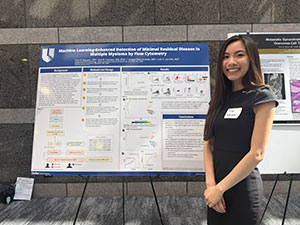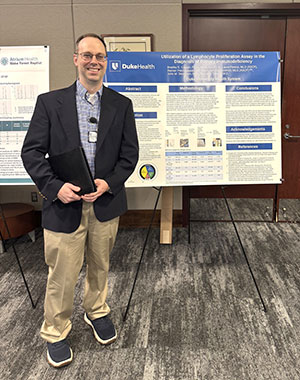
On October 4, 2025, several Pathology Department and Pathologists’ Assistant (Path A) Program members attended and presented at the Imagine 2025 Conference, “Taking Your Laboratories into the Future,” in Chapel Hill. This year’s theme was “Precision Medicine, Digital Innovations, and the Evolving Healthcare Landscape.”

One of the keynote speakers, AI Catalyst Executive Director Thomas Seay, MBA, gave an insightful talk about how AI tools can be used to deliver healthcare more efficiently, improve accessibility, and solve larger problems related to public health. He also discussed the limitations of AI and how scientists will need to take into consideration any drawbacks of implementing new technology. Michael Olivier, PhD, Director of Precision Medicine at Wake Forest University School of Medicine, also gave a keynote speech. Titled “Precision Laboratory Medicine,” Olivier’s talk highlighted how precision medicine must make a true clinical impact by improving patient outcomes through the development of clinical testing that provides information that is usable and helpful.
through the development of clinical testing that provides information that is usable and helpful.
Pathology Professor John Toffaletti, PhD, gave a talk titled “The Path Forward for Serum Creatinine, Cystatin C, and eGFRs for Assessing Chronic Kidney Disease.”
Second-year Pathology resident Tran Nguyen, MD, won an award for her poster, “Machine Learning–Enhanced Detection of Minimal Residual Disease in Multiple Myeloma by Flow Cytometry.”
Other Duke poster presentations included:

- Senior Medical Lab Scientist Bradley Carson, PhD, MLS, Duke University Health System (DUHS) Clinical Labs: “Utilization of a Lymphocyte Proliferation Assay in the Diagnosis of Primary Immunodeficiency”
- Second-Year Path A student Cadey Cousins, BS: “The Pathologists' Assistants Role in Bone Specimen Decalcification: A Case Study Involving Extra Skeletal Osteosarcoma”
- Second-Year Path A student Alexandra Helms, BS: “Assessing the Atypical: The Critical Role of the PA in Examining Pulmonary Pleomorphic Carcinoma”
There was an informatics round table featuring the following individuals:
- Ulysses Balis, MD, director of Pathology Informatics, University of Michigan
- Richard Dick, PhD, serial entrepreneur, InteropKey, LLC, author
- John Hanna, MD, associate chief medical information officer, East Carolina University Health
- Thomas Seay, executive director, AI Catalyst, The Health Management Academy
- Scott Shone, Director North Carolina State Public Health Laboratory, president, Association for Public Health Laboratories
- W. Ed Hammond, PhD, DABCC, director, Duke Center for Health Informatics

There was also a national lab leadership panel titled “Creating the Future of Lab Medicine,” which featured:
- Kyle Riding, PhD, president, American Society for Clinical Laboratory Science (ASCLS)
- Thomas Seay, executive director, AI Catalyst, The Health Management Academy, author
- Scott Shone, PhD, director, North Carolina State Public Health Laboratory, president, Association of Public Health Laboratories (APHL)
- Qihui “Jim” Zhai, MD, president elect, College of American Pathologists (CAP)
The conference was a collaborative effort, with participation from Duke University, the University of North Carolina at Chapel Hill (UNC), East Carolina University (ECU), Atrium Health Wake Forest Baptist, and Atrium Health Charlotte. Duke representatives on the Meeting Planning Committee include DUHS Clinical Laboratories Education/Training Coordinator Laurelin Younger, MCLS, CG (ASCP) and Associate Professor Karra Jones, MD, PhD.